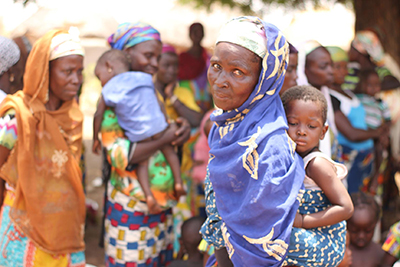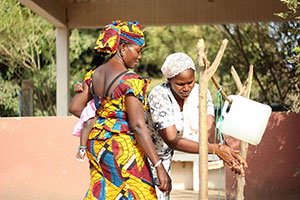SPRING/Kyrgyz Republic Project Overview
This short video is a brief overview of the work that SPRING has been doing in the Kyrgyz Republic since the project began in 2014.
This short video is a brief overview of the work that SPRING has been doing in the Kyrgyz Republic since the project began in 2014.

The SPRING project began work in Ghana in 2014 in response to a request from USAID/Ghana for support to reduce stunting in the Feed the Future zone of influence in the Northern and Upper East Regions of the country.
SPRING trained Mariama and more than 250 other community members from 3 of Senegal’s 14 regions to establish and lead hygiene monitoring units. These units consist of 6-10 highly engaged and influential community members—often community health workers, village chiefs, local government representatives, and school teachers— who serve as champions for improved hygiene practices within their communities.
SPRING’s community-led video approach to improve nutrition in Niger and Burkina Faso received over 6,000 votes in Zilient’s 2017 Resilience Awards, earning it a third place finish among over 40 submissions.
SPRING worked with key populations in the African Sahel to create locally owned and operated video production "hubs" that produced video messaging to encourage improved nutrition and hygiene behaviors.
Under the UPAVAN project, SPRING and Digital Green create community videos promoting nutrition-sensitive agriculture practices in Odisha, India. This community video shows a family working together to plant Indian spinach.
Under the UPAVAN project, SPRING and Digital Green create community videos promoting nutrition-sensitive agriculture practices in Odisha, India. This community video shows neighbors discussing the benefits of chicken raising for improved income, food security, and nutrition.
A central part of SPRING’s work is to share learnings on how to implement effective nutrition programming. As more countries are moving ahead with efforts to end malnutrition globally, the need for large-scale implementation and impact has never been greater. While actors often know what kinds of interventions they need to conduct to combat malnutrition, these interventions are not always carried out with sufficient quality or scale to make the needed impact. That is why more and more implementers, researchers, and other partners are looking to implementation science for help. Dr.
In rural Kpatia-Tengre, a 131-member community in the Talensi District of the Upper East Region of Ghana, a lack of latrines resulted in community members openly defecating around homes and in fields that are used for agriculture. But when members of the community joined members of the nearby Tualabare village to watch a video on improving water, sanitation, and hygiene (WASH) in the first 1,000 days between pregnancy and a child’s second birthday, they began their journey to achieving open defecation-free (ODF) status.
A group of USAID/Senegal and SPRING/Senegal staff observed a few of the activities initiated with SPRING’s support during a three-day field visit from September 19-21, 2017. The group visited six communities and saw nutrition-sensitive agriculture and social and behavior change activities including a micro-garden and a community video dissemination and discussion session.

Le manuel de formation en hygiène est conçu dans le cadre des stratégies du projet SPRING/USAID afin de dispenser d’une formation de base en hygiène, eau et assainissement à l’intention des cellules de suivi WASH.